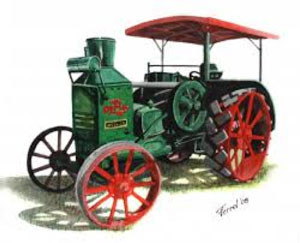
A 30-60 Dirt Loader used to improve roads in rural North Texas in 1914. Nothing like pavement, though.
Last December I decided it would be fun to see what were the leading news stories in 1914, how did North Texas react to the crisis in Europe. The only problem was that none of the three Greenville newspapers were extant. So I widened my field to include newspapers throughout North Texas. Some of the articles were of the same genre found in today’s newspapers; others were very surprising.
Fires, murders, deaths and illnesses, automobile accidents, and robberies made every newspaper. Grand Jury reports were posted in detail after every session. Gambling charges were often filed for shooting craps, especially at the local railroad station. However, it was perfectly legal to play cards or poker at private clubs or lodges for both men and women.
Early 20th century advertising is quite interesting. Not only are the prices eye-openers, but the goods for sale were often unique. Patent medicines could be found among newspaper columns, often as testimonials. Banks, doctors, and dentists blatantly advertised.
Social events were numerous. Schools had box suppers as fund-raisers for desks and seats. Personal announcements shared vacation and visiting plans. Numerous fraternal organizations held meetings and dinners; churches often held lengthy revivals lasting several weeks. Of course, there were marriages, some large while others were small. The most unusual wedding I found in 1914 was held in Naud Burnett’s grocery store on the east side of the Greenville square. No explanation was given for the location.
Railroads advertised special rates in the summer, accidents were reported and there was always someone suing the railroads for injuries. In Hunt County, as well as many other North Texas counties, the plaintiff usually won. The Cotton Belt Railroad built a new $10,000 roundhouse in Commerce.
While the general elections were held in November, most issues were settled in Texas during the Democratic primary held in July. All spring candidates traveled by train and a few by automobile over the entire state campaigning for Good Roads, Socialism, expansion of Prohibition, and closing pool halls.
Football, baseball, track and field events made headlines and entertained local folks. A wagon train traveling westward passed through Commerce in the spring. A comet passed overhead but caused little excitement. Mild days and an ample amount of rainfall in the summer promised an excellent cotton crop for the fall.
Yet, the war that began August 4 when Germany invaded Belgium and garnered very little notice in local newspapers abruptly put a halt to all hopes of a successful cotton harvest. Most cotton grown in North Texas was exported to either England or France in 1914. With a war that looked more ominous and lengthy every day, the international cotton market crashed. France and England scrambled to manufacture uniforms, armaments, and ammunition. Local businessmen began a Buy-a-Bale campaign paying 10 cents per pound, which was a very low price. Naturally, the Buy-a-Bale projects could not finance every bale on the market or even come close. By the end of the year cotton was down to 7.3 cents per pound. Trench warfare along the German borders with France and Belgium had settled in.
A century ago, things looked bleak for everyone throughout the world. We know what happened, the long years of fighting to come that enveloped most of the world. The Great War was rapidly becoming a World War.
I plan to continue reading 1915 newspapers and posting events of the day on my Facebook account. Follow me for more news. I predict it will be 1916 before war news makes headlines in Texas. But watch out for trouble along the Rio Grande. You may be shocked by developments down there.
